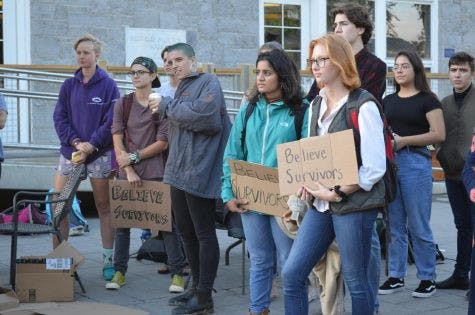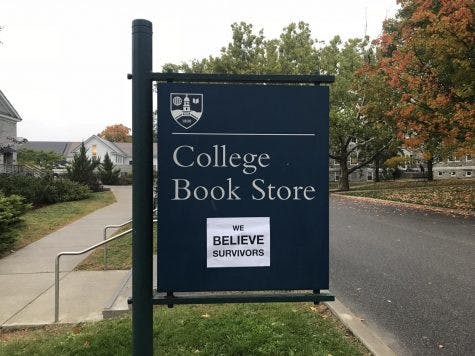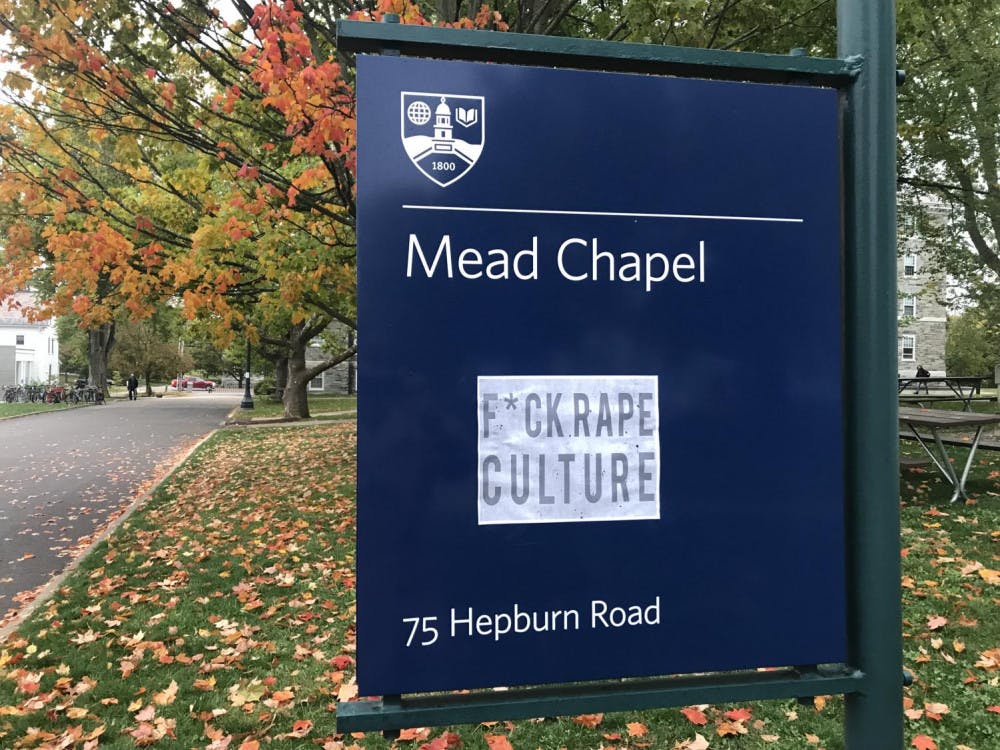The hearings and subsequent confirmation of now-U.S. Supreme Court Justice Brett Kavanaugh sparked national outrage that resonated with many members of the college community over the past two weeks. Across campus, students and faculty publicly expressed their support for Dr. Christine Blasey Ford and survivors of sexual assault with signs, a “Walkout Against the Patriarchy” and chalked messages on pathways.
Signs Supporting Survivors
“WE BELIEVE SURVIVORS,” declared signs that surfaced across campus after the tumultuous Senate hearing addressing Dr. Ford’s sexual assault allegations against Justice Kavanaugh. The lead organizer of the postering campaign, who requested anonymity given her probation status from the Charles Murray protest, printed several posters and emailed the PDF file of the posters to multiple co-activists including Grace Vedock ’20 and Taite Shomo ’20.5.
“I wanted to do something to help make women and survivors feel supported on this campus. To help them feel heard. Believed. Safe. They were my motivation,” the student wrote in a message. “Beyond campus, my sisters were my motivation. My mom. My friends. My future nieces.”
However, responses have not all been positive. Certain signs, such as one posted outside of Proctor Dining Hall, were almost immediately ripped down. Throughout the next few days, additional signs were vandalized and restored. Soon after the initial incident, the Community Bias Response Team (CBRT) weighed in, condemning the vandalism in an all-school email and noting that it violated “the general principle of respectful behavior and community standards.”
A similar action took place outside the suite of Juliana Dunn ’19.5, Vee Duong ’19 and Nathan Nguyen ’19. In a Facebook post, Dunn shared that a student continued to erase the “WE BELIEVE CHRISTINE” text on the whiteboard outside their suite and remove similar paper signs. As of Tuesday evening, the messages had been collectively vandalized nine times.
[pullquote speaker="" photo="" align="center" background="on" border="all" shadow="on"]Supporting survivors should be the norm, not a radical act.[/pullquote]
“As a suite we are unsurprised but still stung by the ripping down and erasing of our signs of solidarity; it felt particularly painful to those of us who are survivors,” the suite members collectively wrote in a message to The Campus. “Supporting survivors should be the norm, not a radical act. We want to expect more of our peers and the institution, but our experiences on campus have largely taught us to prepare for less.”
The primary organizer of the poster campaign also wrote “BELIEVE SURVIVORS” on the chalk message board next to the mail room, including the hotline for WomenSafe (800-388-4205). Throughout the twenty-minute setup process, dozens of women stopped to express their gratitude and identify themselves as survivors.
Protest Against Patriarchy
A “Walkout Against the Patriarchy” started small but grew to a crowd of about 40 professors and students outside of Proctor on Oct. 4. Participants gathered in front of the steps to the dining hall with signs protesting Justice Kavanaugh’s nomination and many passersby joined in after seeing what was occurring.
The mood was somber. Participants expressed their frustration at the Republican Party’s continued support of Justice Kavanaugh despite the accusations of sexual assault, and shared their belief that recent events put women across the nation at risk. Many said they were afraid that Justice Kavanaugh’s confirmation to the Supreme Court would threaten the right to abortion protected by Roe v. Wade.
Participants also discussed concrete ways to make a difference, such as voting and talking about uncomfortable issues with family members and friends. Some suggested that to create change, they would need to look outside of the “Middlebury bubble” and engage with the world at large.
The professors in attendance hoped that their students and their students’ generation as a whole would work hard to protect sexual assault survivors and improve the lives of all women.
Gender Studies professors Laurie Essig and Sujata Moorti, Writing and Rhetoric professor Catharine Wright and Director of Chellis House Karin Hanta arranged the event with help from other faculty members.

Students made signs and joined faculty at the “Walkout Against Patriarchy” outside of Proctor.
“It was last minute,” Essig said. “We got some posters up and put it on Facebook on Wednesday, the day before.”
“I just happened to stumble upon the protest on my way home and stayed a bit to hear people’s thoughts and responses to the situation,” Melisa Topic ’19 said. “I appreciated the mixed student-faculty attendance because I believe it showed both unity and support from all sources on this campus, and demonstrated the diversity in individuals that are feeling some type of way about the Kavanaugh nomination.”
The next day, Feminist Action at Middlebury (FAM) and the Student Government Association (SGA) encouraged students to participate in a “blackout” by wearing black to show support for survivors of sexual assault and for Dr. Ford, Ramirez and Swetnick.
On Saturday, the Senate voted 50-48 to confirm Justice Kavanaugh to the Supreme Court. He was sworn in later that day.
Chalk in Solidarity
Using a rainbow of chalk, students scrawled messages of frustration, despair and support in response to Kavanaugh’s confirmation. Some of the messages were longer: “Men Need to Hold Other Men Accountable” and “Age Does Not Excuse Assault,” while others were simple and impactful: “Believe Survivors” and “We Believe Dr. Ford.”
The chalking was organized by Taite Shomo ’20.5 and executed on Monday and Tuesday.
“I happen to believe those allegations, but his appointment to the Court is much larger than just him. It’s a symbolic message to survivors of sexual assault and abuse that our experiences don’t matter,” Shomo said.
[pullquote speaker="Shomo '20.5" photo="" align="center" background="on" border="all" shadow="on"]The idea that a person can inflict something so painful and traumatizing on another person with no consequences is devastating.[/pullquote]
“I was assaulted when I was 13, only a little younger than Dr. Ford when she was assaulted,” she said. “The idea that a person can inflict something so painful and traumatizing on another person with no consequences is devastating.”
Shomo wonders if she, or other survivors at Middlebury, may someday have to experience what Dr. Ford has gone through, and if they do, whether their story will even matter.
“Chalking campus felt like a cathartic and immediate way to channel some of the anger and sadness I’ve been feeling since Kavanaugh’s appointment in a constructive way” she said.
The purpose of the chalking was not only personal expression. Shomo also hoped to send a message to both survivors and assaulters on campus.
“There are people here who care about what survivors have been through and care about assaulters being held accountable for their actions — even if those actions took place in high school or college,” Shomo said.
Shomo described one moment of the chalking that was particularly rewarding. As she and her girlfriend were writing in front of Proctor, a student walked up to them and asked to borrow their chalk. The student scribed two powerful words: “Me Too.”

One of the signs supporting survivors was placed outside of the bookstore.
Demonstrations Continue as Kavanaugh Takes Seat as Nation’s 114th Supreme Court Justice

BENJY RENTON
WILL DIGRAVIO
Comments



